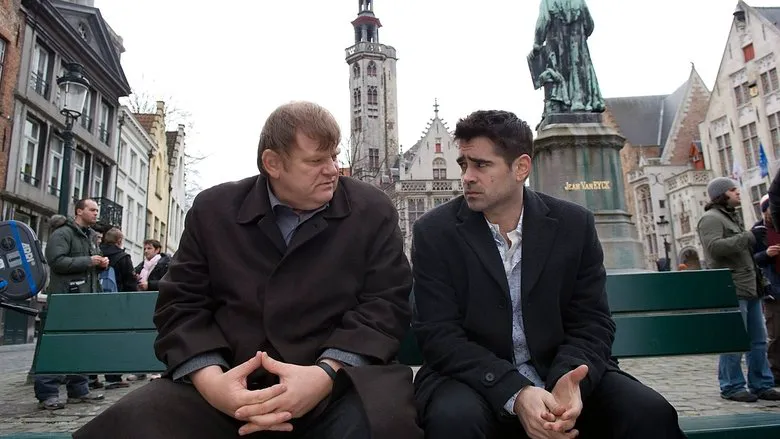In Bruges: A Darkly Comic Twist on the Hitman Trope
Two Irish hitmen find themselves stuck sharing a room in Bruges, Belgium, during the Christmas season due to fully booked hotels. This is hardly ideal for any pair of heterosexual men, let alone a duo of professional killers. However, orders are orders: their boss has sent them on a forced vacation to lay low after a particularly messy job.

The elder of the two, played by Brendan Gleeson, dutifully takes in the sights. The younger, portrayed by Colin Farrell, is bored out of his mind until he meets a dwarf art-house filmmaker and his beautiful assistant, whom he immediately begins to pursue. Things take a darker turn when their boss, played by Ralph Fiennes, orders the elder hitman to kill the younger one. When he refuses, the boss sacrifices his own Christmas holiday to sort things out himself.
Beyond the Surface: More Than Just a Tarantino-esque Comedy
Sounds like a hilarious setup, right? The synopsis, poster, and even the trailer for “In Bruges” (2008) give the impression of a Tarantino or Guy Ritchie-style comedy. But don’t be fooled – this film is something else entirely. “In Bruges” marks the feature-film debut of Martin McDonagh, a young Irish playwright and director who previously won an Oscar for a short film starring Brendan Gleeson. McDonagh is known for writing plays about modern life, filled with characters who speak in a vivid, local vernacular, and for his sharp, observant comedic style. This is evident in “In Bruges”: we’ve never seen hitmen quite like these before.
Relatable Rogues: Hitmen with Everyday Problems
These hitmen are essentially ordinary English (or, fine, Irish – the distinction isn’t as significant as they might like) thugs. You might encounter them on a cheap vacation to Tunisia or Cyprus: downing six pints of beer in a row, smoking a pack and a half of cigarettes a day, sporting sunburned (or, in this case, bluish and frostbitten) skin, and bearing bruised knuckles – these are guys who enjoy a good fight. The characters in the film are similarly simple men who could just as easily be working as sales representatives or fish factory workers. They do, however, swear almost constantly, averaging about one “fuck” per minute. But hey, everyone talks like that on vacation, right? And here’s another funny thought: one of the hitmen declares at one point that he loves his job. Why not? You get to travel the world, meet interesting people, and eliminate them – almost like something out of a Stanley Kubrick film.

The elder hitman is slightly more intelligent and settled, occasionally contemplating God and the afterlife (especially when there’s nothing else to do but visit beautiful Gothic churches) – but in a rather lazy way. Public relations specialists or telephone salespeople probably also realize they’re going to hell, but that doesn’t mean they’re going to quit their jobs.
A Transformation: From Thugs to Humans
Everything changes when the younger hitman finds the love of his life, and the elder begins to feel paternal affection for the younger. The thugs’ eyes are opened, and they spend the next day or so living a genuine life, filled with passion and self-sacrifice. What initially seemed like a crude comedy about hitmen accidentally killing their own informant and having to clean his brains out of the back seat turns out to be something much deeper.
In the end, “In Bruges” reveals itself to be a profound tragedy about morality and suffering, love and self-sacrifice, told through the unlikely lens of two hired guns and one unfortunate corpse – something far stranger, though perhaps not as immediately entertaining, as it initially appears.